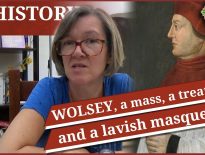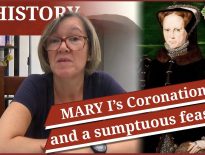On this day in Tudor history, 2nd October 1528, reformer and Bible translator William Tyndale’s book "The Obedience of a Christian Man" was published in Antwerp.
A copy of this book owned by Anne Boleyn ended up being a catalyst of the English Reformation when it was confiscated from the suitor of one of Anne's ladies as a heretical book. Henry VIII ended up reading it and proclaiming that "This Book is for me and all Kings to read.” It set him on his path to the break with Rome and saw him marrying Anne Boleyn as his second wife.
Find out the full story in this talk...
Also on this day in history:
- 1452 - Richard III, the last Plantagenet king, was born at Fotheringhay Castle, Northamptonshire.
- 1501 – Catherine of Aragon arrived in England, landing at Plymouth in Devon. She had come to England to marry Prince Arthur, the heir to the throne of England.
- 1514 – Mary Tudor, sister of Henry VIII, set off from Dover to sail to France to marry King Louis XII. She was eighteen and he was fifty-two, and not in the best of health. They married on 9th October 1514, but the marriage was short-lived as Louis died in January 1515. Mary went on to marry Charles Brandon, the Duke of Suffolk, on the 3rd March 1515.
- 1518 – Treaty of London – Cardinal Wolsey’s treaty of “Universal” peace between France and England was signed.
- 1521 – Pope Leo X was given Henry VIII’s Assertio septem sacramentorum or “Defence of the Seven Sacraments” in Rome. This work led to Henry VIII being proclaimed Fidei Defensor or “Defender of the Faith”.
- 1536 – Start of the Lincolnshire Rising, the beginning of the Pilgrimage of Grace. It was sparked off by a sermon at evensong on the 1st October at St James’s Church, Louth, and by a visitation from a registrar on 2nd October.



Ah, thank you for this. I knew the story about the book, the Cardinal, Anne’s giving it to Henry to read. I also knew he was executed for heresy, but thought it was far later in the reign, nor that it was because of another book. Interesting man. Michelle t
I love the story about Anne and the story of the book belonging to her maid and then it was taken and Anne somehow managed to get it back and it was given to the King. It’s very plausible and Henry really liked it. Well you would if you read that you were the King, answering to God alone and not to the Pope or any Church prelate and it was certainly something Henry Viii acted on. However, the rest of the praise from our commentary that Henry was leading everyone from darkness into light was obviously overly optimistic as Henry’s reasons for breaking with the Pope were personal and not theological. Henry remained Catholic without the Pope, although he did open up avenues into reforms.
William Tyndale was as clever a man as any of the Catholic scholars he jousted with, although his polemic in exchanging words with Thomas More was raw and x rated just as More’s attack was. The two men were passionate in their positions, one who wanted reform and the Bible in English, one who saw Tyndale as dangerous and an arch heretic. Their writing makes for colourful reading at times. Ironically, it wasn’t Thomas More who eventually brought Tyndale to his tragically sticky end in the Netherlands. It was Henry Viii or rather one of his agents. Tyndale was able to arrange for his English New Testament to be smuggled into England during the 1520s and 30s, with Anne owning one and having it on display to be read by all during her short spell as Queen. Anne’s fall inevitably lead eventually to his betrayal, arrest and being burned as a heretic in 1536. He had also written against the divorce of Katherine of Aragon, which upset the King. His protection of Tyndale was withdrawn.
Ironically, it was a great deal of Tyndale that was introduced as part of the Coverdale and Great Bible under King Henry Viii and his work was incorporated into the King James Bible. Another ironic truth, not so well known is that Thomas More didn’t object totally to the Bible in English and neither did the Catholic Church. What they objected to were unauthorised translations which emphasised heretical teaching contradictions to the official Church teaching. Several errors were contained in Tyndale and his language was chosen to emphasise his own reforms and anti Catholic beliefs. It is now well documented that More wanted to authorise an English Bible which would have been a Catholic Bible, but that the political atmosphere of Henry’s marriage got in the way. It is also very ironic that he himself fell foul of Henry’s religious and marriage adventures and was himself executed on a matter of conscience, just as Tyndale had been, this time for objecting to the King as Head of the Church. Not even More’s clever use of the law that silence equalised consent could save him. Not that More was silent. He didn’t say anything himself but he did encourage others to speak out. John Fisher was more radical, he objected loudly and in print and made no bones about how he felt. All of these men may have acted like a load of bone heads but they believed faithfully in their own brand of faith and reason. They were passionate and heroic and all deserve our deepest respect and admiration for their faith and steadfast belief, even in the face of death.